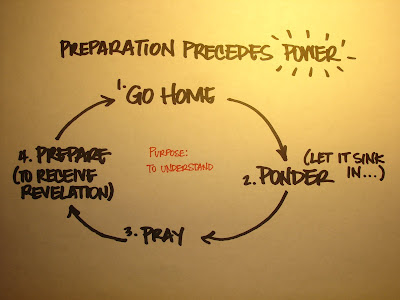My Book of Mormon seminary year is almost over and I'll be taking down my boards in the classroom in about 4-5 weeks. I thought I'd take my camera to class today and take a picture of this before I take it down. My CES Director passed along this storyline/timeline to us. The idea came from a seminary teacher, but I don't know who she is. I drew out this timeline with a Sharpie marker with my own icons and in a way that made sense to me, laminated it, and stapled it to my rolling bulletin board for reference throughout the year. THIS HAS BEEN SO HELPFUL! We refer to it frequently. It helps us to remember what we've studied, and also what to look forward to in upcoming chapters.
It starts on the left and moves to the right. We begin in Jerusalem ("J" with the castle wall) in 600 B.C., and the "zig-zag" is Lehi's journey in the wilderness for 8 years. The "r.i.p." is for Ishmael who dies before they get on Nephi's boat and sail to the Promised Land. The next "r.i.p" is for Lehi who dies before "Nephi & Co." settle in the land of Nephi ("N" with the castle wall) after a separation from Laman and Lemuel. That places us roughly around 2 Nephi 5.
The "Z" at the top of the timeline stands for Zarahemla. There are 3 kings who reside in Zarahemla (Mosiah I, Benjamin, and Mosiah II), and 3 kings who end up in the land of Nephi (Zeniff, Noah, and Limhi). The kings are represented by the crowns.) Zeniff's people travelled to the land of Nephi and ended up being in bondage to the Lamanites until Limhi's people were brought back to Zarahemla, thus the "squiggly lines". This takes us to the end of the Book of Mosiah.
The "r.i.p" after the kings is for the death of King Mosiah II. He was the last king before they switched to a system of judges, which explains the "no kings" and "gavel" icons. During that period, we have the 4 sons of Mosiah doing missionary work with the Lamanites in the land of Nephi for 14 years, and concurrently we have Alma (the younger) and Amulek on a mission to re-activate saints in the Land of Zarahemla. This leads us up to Alma 42.
The flag with the "T" represents Captain Moroni's Title of Liberty. The "2000" shield represents Helaman's Stripling Warriors, and the stick figure standing on a wall being shot at with stones and arrows represents Samuel the Lamanite. That takes us through to the end of the Book of Helaman. The resurrected Christ visits the Nephites (3 Nephi), 200 years of peace (4 Nephi), Mormon and Moroni fight for their lives (Mormon), and the end of the record leaves us at 421 A.D. (Moroni). I didn't include the Book of Ether, which is placed between Mormon and Moroni, because those events happened centuries before and not on this timeline.
I am a visual learner and it helps for me to see something like this drawn out for reference. I photocopied all of these icons, reduced them in size, and cut them up. I gave each student in my class a miniature version of this storyline/timeline in a plastic bag. Periodically I hide my bulletin board and I have them take their timeline pieces out and put them in order from 600 B.C. through 421 A.D. It's good review and I KNOW IT HELPS THEM!!! Again, this timeline wasn't my idea, but I sure love it. I'm happy to share my version with you if it helps you to better understand the events in Book of Mormon.


































